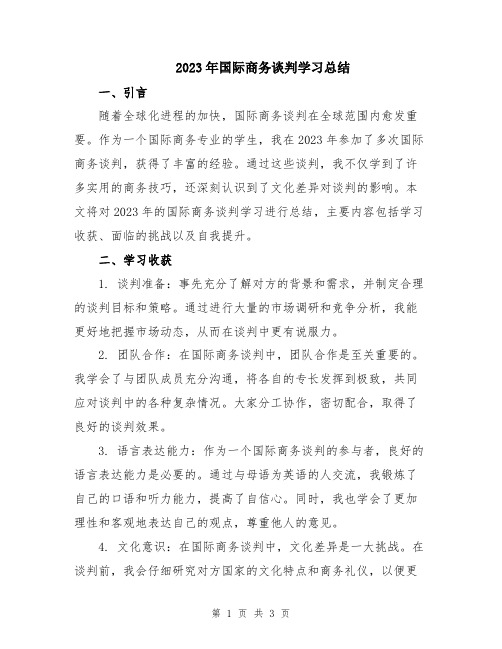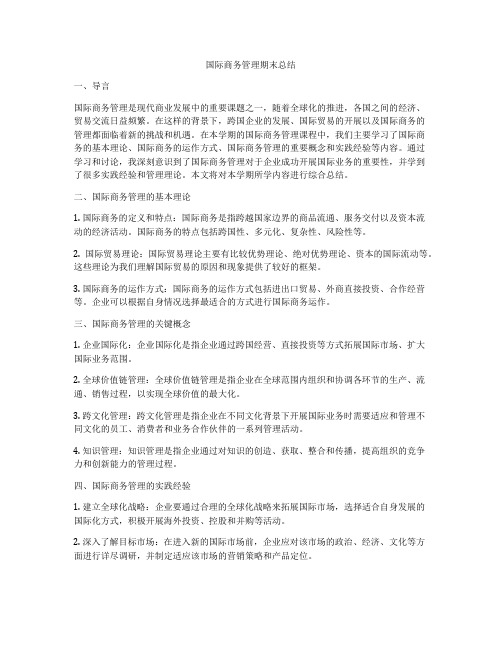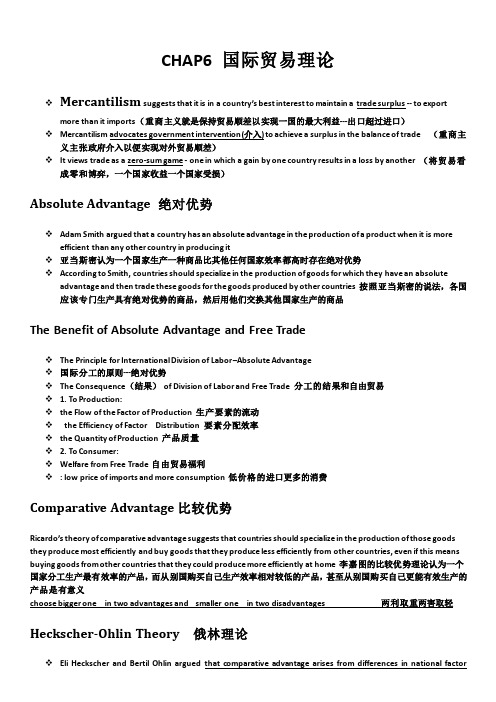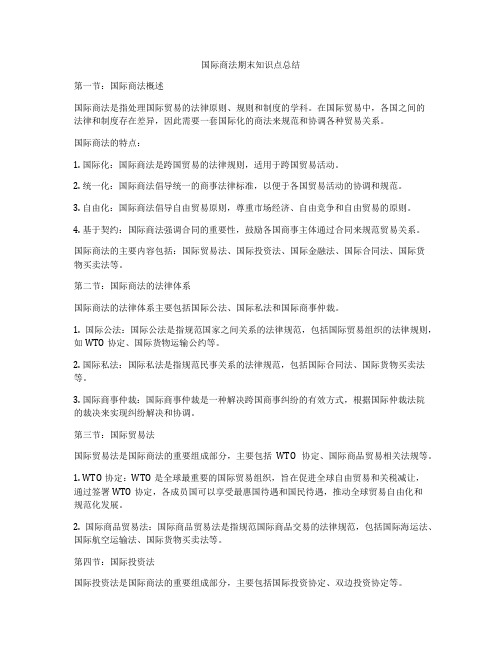国商期末总结
2023年国际商务谈判学习总结

2023年国际商务谈判学习总结一、引言随着全球化进程的加快,国际商务谈判在全球范围内愈发重要。
作为一个国际商务专业的学生,我在2023年参加了多次国际商务谈判,获得了丰富的经验。
通过这些谈判,我不仅学到了许多实用的商务技巧,还深刻认识到了文化差异对谈判的影响。
本文将对2023年的国际商务谈判学习进行总结,主要内容包括学习收获、面临的挑战以及自我提升。
二、学习收获1. 谈判准备:事先充分了解对方的背景和需求,并制定合理的谈判目标和策略。
通过进行大量的市场调研和竞争分析,我能更好地把握市场动态,从而在谈判中更有说服力。
2. 团队合作:在国际商务谈判中,团队合作是至关重要的。
我学会了与团队成员充分沟通,将各自的专长发挥到极致,共同应对谈判中的各种复杂情况。
大家分工协作,密切配合,取得了良好的谈判效果。
3. 语言表达能力:作为一个国际商务谈判的参与者,良好的语言表达能力是必要的。
通过与母语为英语的人交流,我锻炼了自己的口语和听力能力,提高了自信心。
同时,我也学会了更加理性和客观地表达自己的观点,尊重他人的意见。
4. 文化意识:在国际商务谈判中,文化差异是一大挑战。
在谈判前,我会仔细研究对方国家的文化特点和商务礼仪,以便更好地理解和尊重对方。
在实际的谈判中,我学会了灵活应对文化差异,不断调整自己的表达方式,提高谈判的成功率。
三、面临的挑战1. 语言障碍:作为一个非英语国家的学生,英语不是我的母语,因此在国际商务谈判中会面临语言障碍。
有时候,对方的英语说得比较快,我无法很好地理解。
为了应对这个挑战,我利用业余时间刻苦学习英语,通过听力训练和口语练习,逐渐提高了自己的英语水平。
2. 谈判技巧不足:在谈判中,对话方式、谈判技巧和沟通能力起着至关重要的作用。
在初期的谈判中,我发现自己的谈判技巧不足,有时候处理问题不够果断,没有充分发挥自己的优势。
为了提升谈判技巧,我主动学习与实践,积极请教有经验的前辈并阅读相关专业书籍,不断总结和改进自己的谈判技巧。
国际商务管理期末总结

国际商务管理期末总结一、导言国际商务管理是现代商业发展中的重要课题之一,随着全球化的推进,各国之间的经济、贸易交流日益频繁。
在这样的背景下,跨国企业的发展、国际贸易的开展以及国际商务的管理都面临着新的挑战和机遇。
在本学期的国际商务管理课程中,我们主要学习了国际商务的基本理论、国际商务的运作方式、国际商务管理的重要概念和实践经验等内容。
通过学习和讨论,我深刻意识到了国际商务管理对于企业成功开展国际业务的重要性,并学到了很多实践经验和管理理论。
本文将对本学期所学内容进行综合总结。
二、国际商务管理的基本理论1. 国际商务的定义和特点:国际商务是指跨越国家边界的商品流通、服务交付以及资本流动的经济活动。
国际商务的特点包括跨国性、多元化、复杂性、风险性等。
2. 国际贸易理论:国际贸易理论主要有比较优势理论、绝对优势理论、资本的国际流动等。
这些理论为我们理解国际贸易的原因和现象提供了较好的框架。
3. 国际商务的运作方式:国际商务的运作方式包括进出口贸易、外商直接投资、合作经营等。
企业可以根据自身情况选择最适合的方式进行国际商务运作。
三、国际商务管理的关键概念1. 企业国际化:企业国际化是指企业通过跨国经营、直接投资等方式拓展国际市场、扩大国际业务范围。
2. 全球价值链管理:全球价值链管理是指企业在全球范围内组织和协调各环节的生产、流通、销售过程,以实现全球价值的最大化。
3. 跨文化管理:跨文化管理是指企业在不同文化背景下开展国际业务时需要适应和管理不同文化的员工、消费者和业务合作伙伴的一系列管理活动。
4. 知识管理:知识管理是指企业通过对知识的创造、获取、整合和传播,提高组织的竞争力和创新能力的管理过程。
四、国际商务管理的实践经验1. 建立全球化战略:企业要通过合理的全球化战略来拓展国际市场,选择适合自身发展的国际化方式,积极开展海外投资、控股和并购等活动。
2. 深入了解目标市场:在进入新的国际市场前,企业应对该市场的政治、经济、文化等方面进行详尽调研,并制定适应该市场的营销策略和产品定位。
国际商务函电期末总结

国际商务函电期末总结在这学期的国际商务课程中,我学到了很多关于商务函电的知识和技巧。
通过阅读和撰写各种类型的商务函电,我对国际商务的交流方式有了更深入的理解,也提高了我的书写和沟通能力。
在此期末总结中,我将回顾所学的主要内容,并总结这段时间的学习体会和心得。
首先,我学习的内容包括商务函电的基本知识、书写技巧和礼仪规范。
在学习商务函电的基本知识方面,我了解了商务函电的定义、分类和特点。
商务函电旨在进行商务交流和合作,因此在撰写商务函电时需要准确、简明和专业。
同时,商务函电也需要遵守一定的格式和礼仪规范。
学习这些知识对我提高书写和表达能力非常有帮助。
其次,我学习了不同类型的商务函电,并进行了实践。
在这门课程中,我阅读和分析了各种类型的商务函电,包括询价信、报盘函、订单确认、催款函等。
通过这些实例的学习,我了解了每种类型商务函电的目的、结构和语言风格。
此外,我还进行了商务函电的实践撰写。
在老师的指导下,我模仿实际商务场景,撰写了一些商务函电。
这个实践过程让我更好地理解商务函电的要求,并提高了我的书写能力。
国际商务函电的撰写与国内商务函电有一些略微不同之处。
首先,国际商务函电需要考虑到不同国家和地区的文化差异。
在撰写商务函电时,我们需要尊重对方的文化习俗,避免使用带有负面意义的语言和行为。
其次,国际商务函电还需要考虑到语言的翻译问题。
在撰写商务函电时,我们需要使用简单、明确和易于翻译的语言,以确保对方能准确理解我们的意思。
最后,国际商务函电中还经常会涉及到一些国际贸易的特殊条款和格式,我们需要对这些内容有所了解,以便能正确地使用和理解。
在学习过程中,我还学到了一些关于国际商务交流的技巧。
首先,我学会了如何进行有效的信息收集和分析。
在进行商务交流之前,我们需要对目标市场、合作伙伴和竞争对手进行调研和了解,这可以帮助我们更好地为商务函电撰写提供依据。
其次,我学会了如何进行有效的沟通和协商。
在商务函电的撰写中,我们需要清楚地表达我们的意图和要求,并与对方进行协商。
国际商务期末复习总结

CHAP6 国际贸易理论Mercantilism suggests that it is in a country’s best interest to maintain a trade surplus -- to export more than it imports(重商主义就是保持贸易顺差以实现一国的最大利益---出口超过进口) Mercantilism advocates government intervention(介入) to achieve a surplus in the balance of trade (重商主义主张政府介入以便实现对外贸易顺差)It views trade as a zero-sum game - one in which a gain by one country results in a loss by another (将贸易看成零和博弈,一个国家收益一个国家受损)Absolute Advantage 绝对优势Adam Smith argued that a country has an absolute advantage in the production of a product when it is more efficient than any other country in producing it亚当斯密认为一个国家生产一种商品比其他任何国家效率都高时存在绝对优势According to Smith, countries should specialize in the production of goods for which they have an absolute advantage and then trade these goods for the goods produced by other countries 按照亚当斯密的说法,各国应该专门生产具有绝对优势的商品,然后用他们交换其他国家生产的商品The Benefit of Absolute Advantage and Free TradeThe Principle for International Division of Labor–Absolute Advantage国际分工的原则---绝对优势The Consequence(结果) of Division of Labor and Free Trade 分工的结果和自由贸易1. To Production:the Flow of the Factor of Production 生产要素的流动the Efficiency of Factor Distribution 要素分配效率the Quantity of Production 产品质量2. To Consumer:Welfare from Free Trade自由贸易福利: low price of imports and more consumption 低价格的进口更多的消费Comparative Advantage比较优势Ricardo’s theory of comparative advantage suggests that countries should specialize in the production of those goods they produce most efficiently and buy goods that they produce less efficiently from other countries, even if this means buying goods from other countries that they could produce more efficiently at home李嘉图的比较优势理论认为一个国家分工生产最有效率的产品,而从别国购买自己生产效率相对较低的产品,甚至从别国购买自己更能有效生产的产品是有意义choose bigger one in two advantages and smaller one in two disadvantages 两利取重两害取轻Heckscher-Ohlin Theory 俄林理论Eli Heckscher and Bertil Ohlin argued that comparative advantage arises from differences in national factorendowments(天赋)– the extent to which a country is endowed with resources like land, labor, and capital 赫克歇尔和俄林认为比较优势是由各国生产要素禀赋的差异引起的,指一国的一些资源比如土地,劳动力还有资本The Heckscher-Ohlin theory predicts that countries will export goods that make intensive use of those factors that are locally abundant, while importing goods that make intensive use of factors that are locally scarce赫克歇尔俄琳理论预测一国将出口密集型使用本国充足要素的产品,进口密集使用本国稀缺要素的产品To take advantage of factor of endowmentsNew Trade Theory 新贸易理论New trade theory suggests that the ability of firms to gain economies of scale (unit cost reductions associated with a large scale of output) can have important implications for international tradeNew trade theory suggests that:through its impact on economies of scale, trade can increase the variety of goods available to consumers and decrease the average cost of those goods贸易可以通过对规模经济的影响增加消费品的种类,降低这些商品的平均成本in those industries when output required to attain economies of scale represents a significant p roportion of total world demand, the global market may only be able to support a small number of enterprises 一些应该达到规模经济的产业,所生产的产品占世界总需求的比重较大,这样全球市场就只能容纳数量很少的企业Factor Endowments 要素禀赋Factor endowments refer to a nation’s position in factors of production n ecessary to compete in a given industry 要素禀赋理论意味着国家态度对一个特定行业生产要素的竞争是很必要的A nation's position in factors of production can lead to competitive advantage国家对生产要素的使用态度可以导致比较优势These factors can be either basic (natural resources, climate, location) or advanced (skilled labor, infrastructure, technological know-how) 要素可以是基础的也可以是高等的First-Mover Advantages 第一进入者优势Being a first mover can have important competitive implications, especially if there are economies of scale and the global industry will only support a few competitors第一进入者有重要的竞争影响,特别是规模经济或者全球行业只有少量竞争者时Firms that establish a first-mover advantage may dominate global trade in that product公司建立了第一个优势可能会在全球贸易中占主导地位Porter’s Diamond波特的钻石理论Michael Porter tried to explain:(1)why a nation achieves international success in a particular industry, while some nations fail 为什么一个国家在特定行业取得国际成功(2 )how to get successful in a particular industry: identified four attributes that promote or impede the creation ofcompetitive advantage:如何在特定行业取得成功,确定了4大特性促进或阻碍竞争优势的建立Factor endowments 要素禀赋Demand conditions需求情况Relating and supporting industries相关与支持产业Firm strategy, structure, and rivalry 企业组织,战略与竞争CHAP8 国际直接投资FDI 国际直接投资Foreign direct investment (FDI) occurs when a firm invests directly in new facilities to produce and/or market ina foreign country国际直接投资发生在一家企业在国外直接投资用于生产或者销售时FDI can be:1)greenfield investments- the establishment of a wholly new operation in a foreign country.新设投资,在国外开设新的企业2)acquisitions or mergers with existing firms in the foreign country在国外收购或合并一家现成的企业Stock of FDI 国际直接投资的存量Outflows of FDI are the flows of FDI out of a country对外直接投资是一国国际直接投资的流出Inflows of FDI are the flows of FDI into a country外来直接投资是一国国际直接投资的流入Why do firms choose FDI instead of:(1)exporting - producing goods at home and then shipping them to the receiving country for sale 出口涉及在国内生产货物然后将其运到购买这些货物的国家(2)licensing - granting a foreign entity the right to produce and sell the firm’s product in return for a royalty feeon the license granting.技术授权是赋予外国公司生产和销售其产品的权利,并对其销售的每一个产品收取转让费An export strategy can be constrained by:(1) transportation costs 运费(2) trade barriers 贸易壁垒(3) can not take the advantage of factors endowment 不能发挥要素禀赋的优势Foreign direct investment may be undertaken as a response to actual or threatened trade barriers such as import tariffs or quotas国际直接投资的增长速度超过世界贸易和产出的原因回避未来的贸易壁垒;民主政治制度和自由市场经济转变的总体趋势;世界经济的全球化Benefits And Costs Of FDIHost-Country Benefits 东道国的收益1.resource transfer effects - FDI can make a positive contribution to a host economy by supplying capital, technology, and management resources that would otherwise not be available资源转移效应国际直接投资对东道国的经济有积极的贡献,他可以提供东道国所缺乏的资本,技术和管理经验2.employment effects - FDI can bring jobs to a host country that would otherwise not be created there就业效应是指能为东道国带来原先没有的就业机会3.balance of payments effects - a country’s balance-of-payments account is a record of a country’s payments to and receipts from other countries国际收支效应。
国际商法期末知识点总结

国际商法期末知识点总结第一节:国际商法概述国际商法是指处理国际贸易的法律原则、规则和制度的学科。
在国际贸易中,各国之间的法律和制度存在差异,因此需要一套国际化的商法来规范和协调各种贸易关系。
国际商法的特点:1. 国际化:国际商法是跨国贸易的法律规则,适用于跨国贸易活动。
2. 统一化:国际商法倡导统一的商事法律标准,以便于各国贸易活动的协调和规范。
3. 自由化:国际商法倡导自由贸易原则,尊重市场经济、自由竞争和自由贸易的原则。
4. 基于契约:国际商法强调合同的重要性,鼓励各国商事主体通过合同来规范贸易关系。
国际商法的主要内容包括:国际贸易法、国际投资法、国际金融法、国际合同法、国际货物买卖法等。
第二节:国际商法的法律体系国际商法的法律体系主要包括国际公法、国际私法和国际商事仲裁。
1. 国际公法:国际公法是指规范国家之间关系的法律规范,包括国际贸易组织的法律规则,如WTO协定、国际货物运输公约等。
2. 国际私法:国际私法是指规范民事关系的法律规范,包括国际合同法、国际货物买卖法等。
3. 国际商事仲裁:国际商事仲裁是一种解决跨国商事纠纷的有效方式,根据国际仲裁法院的裁决来实现纠纷解决和协调。
第三节:国际贸易法国际贸易法是国际商法的重要组成部分,主要包括WTO协定、国际商品贸易相关法规等。
1. WTO协定:WTO是全球最重要的国际贸易组织,旨在促进全球自由贸易和关税减让,通过签署WTO协定,各成员国可以享受最惠国待遇和国民待遇,推动全球贸易自由化和规范化发展。
2. 国际商品贸易法:国际商品贸易法是指规范国际商品交易的法律规范,包括国际海运法、国际航空运输法、国际货物买卖法等。
第四节:国际投资法国际投资法是国际商法的重要组成部分,主要包括国际投资协定、双边投资协定等。
1. 国际投资协定:国际投资协定是指两个或多个国家签署的关于投资的法律协定,旨在促进国际投资和保护投资者的合法权益。
2. 双边投资协定:双边投资协定是指两个国家签署的关于投资的法律协定,其内容主要包括投资保护、国民待遇、最惠国待遇等。
商专期末总结

商专期末总结一、引言商专期末考试意味着本学期的结束和新学期的开始,是对所学知识的一次全面总结与检验。
在这个期末总结中,我将回顾本学期的学习成果和经验教训,并对下一学期的学习目标和规划进行规划和展望。
二、本学期学习成果回顾在本学期的学习中,我注重提高自己的理论知识和实践能力。
透过大量的课堂学习和实践操作,我对商科相关学科有了更加深入的了解和掌握。
以下是我在不同学科方面取得的一些成果。
1. 会计学在会计学课程中,我通过学习会计的基本原理和方法,掌握了财务报表的编制和分析技巧。
我能够熟练运用会计准则和会计软件进行财务报表的编制,也能够基于财务报表进行企业的财务健康状况分析。
这些知识将对我未来的职业发展有很大的帮助。
2. 经济学在经济学方面,我学习了宏观经济和微观经济的相关理论和模型。
通过分析市场结构、供求关系等因素,我能够更好地理解经济发展和运行的机制。
此外,我还学习了经济政策的制定和实施,了解了货币政策、财政政策等对经济的影响。
这让我能够更加深入地理解和研究经济领域的问题。
3. 市场营销学市场营销学是我的兴趣所在,也是我未来职业发展的方向之一。
在市场营销学课程中,我学习了市场调研、市场分析、市场定位、营销策略等相关知识。
通过实践项目,我还了解了市场营销的具体操作和实施。
这些知识和技能对我未来从事市场营销工作具有重要意义。
三、本学期学习经验教训总结在本学期的学习中,我也遇到了一些挑战和困难。
总结经验教训,对今后的学习有很大的帮助。
首先,要保持良好的时间管理能力。
在本学期中,我发现将时间安排得当是非常重要的。
合理分配时间,能够更好地完成学习任务,并避免临时抱佛脚。
其次,要注重实践操作。
商专学科与实践紧密相关,通过实践操作能够更好地理解和应用所学知识。
在下一学期,我会更多地参与实践项目,提升自己的实践能力。
另外,要建立良好的学习习惯。
每天坚持学习,复习和巩固所学知识,培养自主学习能力。
这样才能更好地适应今后的学习和工作。
国际商务学习总结

国际商务学习总结在进行国际商务学习的过程中,我积累了丰富的知识和经验。
下面是我对国际商务学习的总结。
一、重要性和价值国际商务是现代经济的重要组成部分,对各国的经济发展和国际贸易起着重要作用。
通过学习国际商务,我了解到国际贸易的基本原理、规则和流程,学会了如何开展跨国业务,提高了自身的国际竞争力。
二、知识体系和理论基础在国际商务学习中,我接触到了很多重要的知识体系和理论基础。
比如,国际贸易理论,其中包括比较优势理论、绝对优势理论等,这些理论帮助我更好地理解国际贸易的原理和规律。
另外,我还学习了国际商务法律法规、国际商务管理、国际市场营销等重要的知识领域。
三、实践活动在国际商务学习的过程中,我积极参与各种实践活动,提高了自己的实际操作能力。
比如,我参加了模拟国际贸易实训,通过模拟真实的国际贸易流程,学会了如何与国外客户进行沟通、谈判和签订合同。
此外,我还参观了一些知名国际企业,亲身感受了他们的管理和运营模式。
四、跨文化交流国际商务学习还促进了我与不同文化背景人员的交流和合作。
在国际商务的实践中,我与来自不同国家和地区的人员进行了频繁的交流,学会了尊重和理解不同文化的重要性。
这不仅使我成为一个更具国际视野和跨文化交际能力的人,也拓宽了我的人脉资源。
五、挑战和机遇学习国际商务也面临着一些挑战,比如语言障碍、文化差异、贸易壁垒等。
但是,这些挑战也带来了机遇。
通过克服这些困难,我提高了自己的语言能力和跨文化交际能力,同时也学会了如何应对和利用贸易壁垒,寻找更多的商机。
综上所述,国际商务学习是一项重要且有价值的学习。
通过学习国际商务,我不仅掌握了国际贸易的基本知识和理论,还提高了自身的实践操作能力和跨文化交际能力。
国际商务学习的过程充满了挑战和机遇,但只要我们保持积极的学习态度和开放的心态,相信我们一定能够在国际商务领域取得更好的成绩。
国际商务学习的总结完毕。
中专国际商务个人期末总结

中专国际商务个人期末总结一、引言在本学期的学习中,我深入学习和了解了国际商务的基本理论和实践知识。
通过课程的学习和实践活动的参与,我受益匪浅,对国际商务的概念、特点和发展趋势有了更加深刻的理解。
在此篇文中,我将总结本学期所学的主要知识,并反思自己在学习和实践中的不足和需要改进之处。
二、知识总结1.国际商务的概念和特点国际商务是指企业通过跨越国界的贸易和经济活动,实现产品、服务和资金等要素的国际流动。
国际商务具有以下特点:跨国操作、多元文化、复杂环境、高风险和高回报。
2.国际市场分析在进行国际商务活动前,必须进行全面的国际市场分析,包括宏观环境、市场需求、竞争对手、市场进入障碍等方面的研究。
只有全面了解市场情况,才能做出有效的商务决策。
3.国际贸易方式和国际支付方式国际贸易方式包括直接贸易、代理贸易、分销贸易等,国际支付方式包括信用证、托收、汇款等。
了解和选择适合的贸易方式和支付方式对于降低贸易风险、提高效率至关重要。
4.跨国公司的组织架构和管理跨国公司的组织架构和管理方式不同于国内公司,需要兼顾全球统一和地区差异的要求。
了解不同的组织架构和管理方式,并灵活运用,可以提高跨国公司的经营效果。
5.国际市场营销和国际谈判技巧国际市场营销需要根据不同国家和地区的文化差异和市场需求进行定制化的市场营销策略。
而国际谈判技巧则需要在了解对方文化的基础上,灵活运用不同的谈判技巧来达成共识。
三、学习收获在本学期的学习中,我对国际商务的基本概念和特点有了更加深入的理解。
我了解到,国际商务的发展趋势是全球化、信息化和智能化,这对于企业的发展和竞争必须有相应的战略和能力。
我也学到了如何进行国际市场分析,了解市场需求和竞争状况,从而制定适合的商务决策。
此外,我还学习了如何选择合适的贸易方式和支付方式,以及国际市场营销和谈判技巧。
这些知识和技能对于我今后在国际商务领域的工作和职业发展具有重要意义。
四、不足和改进在学习和实践中,我也发现了自己的不足和需要改进之处。
- 1、下载文档前请自行甄别文档内容的完整性,平台不提供额外的编辑、内容补充、找答案等附加服务。
- 2、"仅部分预览"的文档,不可在线预览部分如存在完整性等问题,可反馈申请退款(可完整预览的文档不适用该条件!)。
- 3、如文档侵犯您的权益,请联系客服反馈,我们会尽快为您处理(人工客服工作时间:9:00-18:30)。
国际商法期末总结第一章1.惯例概念custom:A long established tradition or usage that becomes customary law if it is (a) consistently and regularly observed and (b)recognized by those states observing it as a practice that they must obligatorily follow.2.来源What are the sources of international law::①treaties and conventions ②custom ③general principles ④others3.国际法主体subjects:States,International organizations,Individuals.4.大陆法系概念civil law:(1)The legal system derived from Roman and Germanic practice and set out in national law codes.(2)As distinguished from public law,the body of law dealing with the rights of private citizens.5.哪些国家属于大陆法系:Continental Europe, Russia, China, Japan, Quebec(Canada), Louisiana(U.S.A), Scotland(U.K.), some states in Asia, Africa & Latin America which used to be the colonies of European countries like Spain, Portugal & France6.英美法系common law:The legal system of England and countries that were once English colonies.It is based primarily on court-made rules or precedent.7.哪些国家属于英美法系:U.K., British Common Wealth Countries, U.S.A, Ireland, and some countries and areas which used to be the colonies of the Great Britain, such as Hong Kong8.International law:The body of legal rules and norms that regulates activities carried on beyond the legal boundaries of a single state.第二章1.征收概念expropriation:A taking of private property by a government.2.国家责任概念state responsibility:Liability of a state for the injuries that it causes to aliens and foreign businesses.3.海外投资保险需要承担哪些风险:①expropriation(both outright and creeping) ②Currency Inconvertibility ③Political Violence第三章1.解决国际争端方式Dispute Settlement through Diplomacy :①Negotiation ②Mediation ③Inquiry2.调停概念good offices:A third party who provides the mans by which two disputing parties may communicate with each other.3.调解概念conciliation:The process by which an impartial third party makes an independent investigation and suggests a solution to a dispute.4.投资争端解决机构仲裁问题ICSID Arbitration:①Governing Law ②Constituting an Arbitration Tribunal:(1)2 preliminary conditions .Both the home state & the host state are members to ICSID ▪The investor & the host state must both consent to ICSID jurisdiction .(2)the parties can choose the arbitrators & the place of arbitration freely only when they reach an agreement on these issues.(3)the jurisdiction of ICSID arbitration is exclusive ③Jurisdiction.(1)Personal Jurisdiction;▪State Party: a contracting state ▪Private Party: a national of another contracting state(2)Subject Matter Jurisdiction. ▪Disputes ▪Investment Disputes ④Provisional Measures & Awards ⑤Enforcement 1)the award is binding on the parties 2)the court of the statesparties are forbidden to review the award 3)the states are obliged to enforce the award as if it were a final judgement of their own courts 4)if the award were not being enforced, an investor can seek diplomatic protection.5.绝对豁免absolute sovereign immunity: Rule that a foreign state is immune from all types of suits.All acts of a government can be immune6.相对豁免restrictive sovereign immunity:Theory that a foreign state is not immune when the cause of action for a suit is based on conduct unrelated to the state's governmental activities.Only governmental acts can be immune第四章1.有限合伙概念civil law limited partnership:A company of two or more persons,at least one of whom has unlimited personal liability for the debts of the business and at least one other who is an investor having limited liability.2.普通合伙概念civil law partnership:A company of two or more persons who co-own and manage a business and who are each liable to the full extent of their personal assets for its debts.3.合伙组织特征Characteristics of a Partnership:①1) It is co-owned and managed by its investors-partners; 2) Its profits and losses are shared by the partners; 3) The partners have unlimited liabilities( maybe in some kinds of partnerships not all partners have unlimited liabilities, but at least one partner must do ); 4) It is not regarded as a juridical person in most countries.4.大陆法上有限责任公司概念Limited Liability Company/Private Corporation:A corporation owned by members that does not issue negotiable share certificates and is subject to minimal public disclosure laws.5.特征:1) There is no division of the capital into stock shares in civil law countries, the contribution of each member is called ‘participation’. The corporation cannot issue share certificates. Instead the members make contributions to the corporation; 2) The transfer of a member’s contribution must be subjectto some restrictions both in the corporation law & in the incorporating documents; 3) The corporate financial statements are subject to less strict public disclosure laws. 6.股份有限公司概念stock corporation:A corporation than can raise money in the public marketplace through the sale of freely transferable shares,Its financial statements have to be disclosed to the public.7.特征:1) The whole capital should be divided into stock shares, and the corporation can issue the shares to raise money in the public market place; 2) The issued share certificates are negotiable in a public market place; 3) Corporate financial statements must be available to the public.8.公司章程概念Articles of Incorporation:The basic instrument creating and defininga particular corporation,which is field with a state agency at the time of the firm's incorporation.9. 大陆法系注册资本:①Drafting incorporating documents- Articles of Association;②At least a minimum capital must be subscribed.10.英美法系注册资本:①Authorized Capital in common law countries form of the Investment ②An organizational meeting is held among stockholders & an initial board of directors is appointed or elected by them. ③The incorporating documentsare register with the appropriate public office.11.普通股Classified stock:Stock that is categorized according to the persons who may own it or by the benefits it gives its owners.优先股preferred stock:Stock that gives its owner benefits that ordinary stockholders do not have.优先股与普通股的区别:cumulative voting:Par Shares vs Non Par Shares.12.分支结构不同的组成部分包括哪些:parent company,agent,branch,subsidiary. 区别:agent:An independent person or company with authority to act on behalf of another.branch:Unite or part of a company.It is not separately incorporated.Subsidiary:Company owned by a parent or a parent's holding company.Unlike a branch,it is separately incorporated.13.揭开公司面纱概念pierce the company veil:An expression indicating that the legal fiction that a company is a separate legal entity will be set aside and the shareholders of the company will be held liable for its conduct as if they were partners in a partnership.14.谁可以作出判决揭开公司面纱:①the controlled company ②the alter ego company ③undercapitalization ④personal assumption of liability.第五章1.关于世贸组织的基本原则Foundational Principles:①Nondiscrimination(The Most-Favored-Nation Rule,The National Treatment Rule)②Protection through Tariffs关税保护(bound tariff rate)③Transparency透明度原则④Regional Integration地区一体化(Free trade area,customs union)2.贸易救济措施WTO identifies three primary types:①antidumping (counteracting unfairly low prices) ②countervailing duties (counteracting subsidies) ③safeguards (temporary relief from import surges)3.区别Distinctions from AD& CVD measures:(1)Nature of underlying activity ①AD and CVD counteract “unfair”trade practices ②In safeguard cases, there is no issue of unfairness(2)Nature of injury varies ①AD and CVD require only material injury ②Safeguards require serious injury(3)Nature of remedy ①AD and CVD limited to the amount of dumping or subsidization②Safeguard remedies more flexible(4)Duration of remedy ①AD and CVD can last forever, although there are reevaluations every five years ②Safeguard measures usually shorter in duration—often three years to avoid need to compensate.第六章1.外资受东道国限制Limitations for Foreign Investments and the Application Screening:①limitations on business forms,Preference:have local participation —joint venture;fully disclose their activities to the public—stock corporation. ②外资股权限制limitations on foreign equity ③sectoral limitations:closed sectors: being totally closed to foreign investment;restricted sectors:permitting a limited percentage of foreign participation;foreign priority sectors: full or majority foreignownership is allowed or even encouraged. ④geographic limitations2.外资监管措施Supervision of foreign investment:①Start-up standards: time limit in which to start construction and/or begin operation. ②Operational reviews: submission of information on various aspects of the business activities, plus regular inspections of its plants, facilities and records. ③Modification of foreign investment agreements: should be approved by the host country. ④Protection of subsidiaries: to prevent foreign investors from abusing their local subsidiaries and their subsidiaries' creditors. ⑤disclosure of information ⑥protection for subsidiaries from the disadvantageous decisions by their parent company. ⑦protection of a subsidiary’s minority shareholders: appraisal rights; rights to minimum guaranteed dividends. ⑧债权人protection of a subsidiary’s creditors: Piercing the Corporate V eil; Deep Rock Doctrine/Equitable Subordination Rule.3.内幕交易insider trading:The use of material nonpublic information about a company or the securities market to buy or sell securities for personal gain.4.收购takeover:the purchase of the publicly traded stock shares of a target corporation, which is aimed at changing in the controlling interest of this corporation. Takeovers may be hostile or friendly.第七章1.知识产权intellectual property:Useful artistic and industrial information and knowledge.2.版权概念copyright:An incorporeal statutory right that gives the author of an artistic work,for a limited period,the exclusive privilege of making copies of the work and publishing and selling the copies.①保护对象what is protected: 作品的表达方式the expression of the work②涉及的权力:财产上pecuniary rights:Right of an author to exploit a copyright work for economic gain;精神上道德权利moral rights:The right of an author to prohibit others from tampering with a copyright work.③保护条件:(1)originality:a work must be original to be protected. (2)fixity: being fixed in any tangible medium of expression. (3)邻接权neighboring rights: rights created by new laws which are parallel but separate from the existing copyright laws to provide protection for new kinds of works. ④时间范围Scope and duration:scope: A copyright applies only within the territory of the state granting it. duration:A copyright of a work exists in the whole life of its author and lasts for 50 years following the author’s death.3.专利概念patent:An incorporeal statutory right that gives an inventor,for a limited period,the exclusive right to use or sell a patented product or to use a patented method or process.①保护的3个条件Inventions that qualify for patent protection:新颖性newness: no other inventor has obtained a patent for the same invention;创新性inventiveness: the subject matter of the invention was not obvious at the time of the invention's making to a person having ordinary skill in the art of the subject matter.;工业适用性industrial application: the product or process of an invention can be used in industry or commerce.②保护对象Specified forms of patents:design patents,plant patents,utility patents③时间范围Scope and duration:scope: within the territory of the state granting it;duration: a 20-year minimum term of protection for patents is set out by TRIPS.4.商标trademark:①保护条件:(1)Acquiring trademarks:two ways to acquire trademarks: by use or by registration;the priority of the first user/ the priority of the first applicant. (2)Registration of trademarks:registration criteria: a) not infringe on any other mark; b) be distinctive ;requirement of usage: in most countries, a mark can be obtained by registration even if it has never been used in commerce;refusing registration;registration review.②时间范围Scope and duration:scope: a registered trademark can only be protected within the territory of the registering state the protection of famous trademarks;duration: TRIPS Agreement requires WTO member states to protect registered trademarks for at least 7 years. Trademarks are to be indefinitely renewable.5.专有技术概念know-how:Practical expertise acquired from study,training,and experience.与专利不同Differences from patents:①being protected by the law of contracts and torts instead of specific legislations ②keeping secret by the owners ③without time and scope limitations6.独家许可协议exclusive licenses:A license that restricts who may compete with the license.7.地域限制territorial restrictions:①exhaustion-of-rights doctrine ②common origin doctrine8.Exhaustion-of-rights doctrine:Once a good made or sold under license is in circulation,the licensor has no further right to control its distribution.mon origin doctrine:Owners of the same intellectual property right who acquired it from a common predecessor cannot restrict each other from using the right.。
